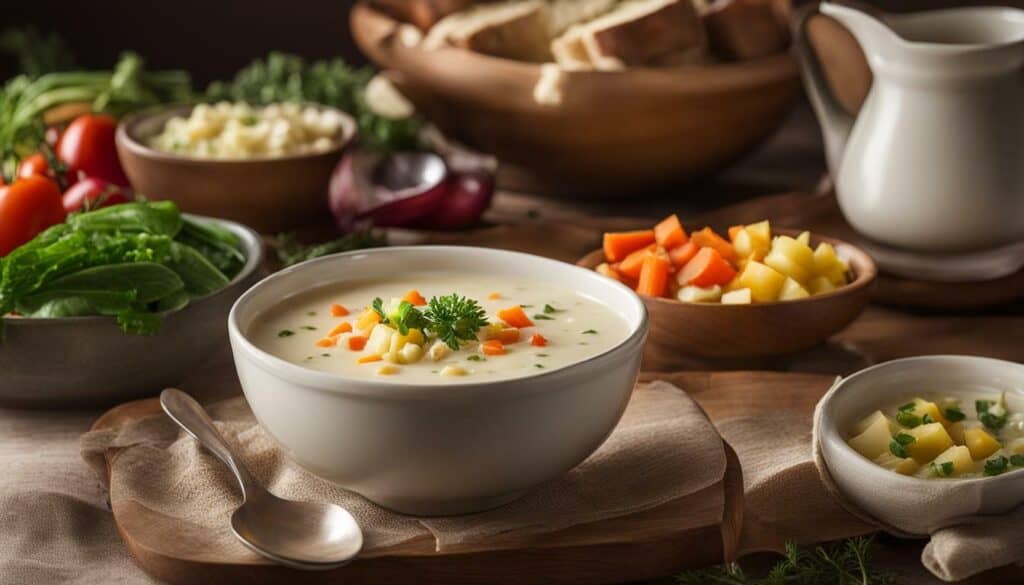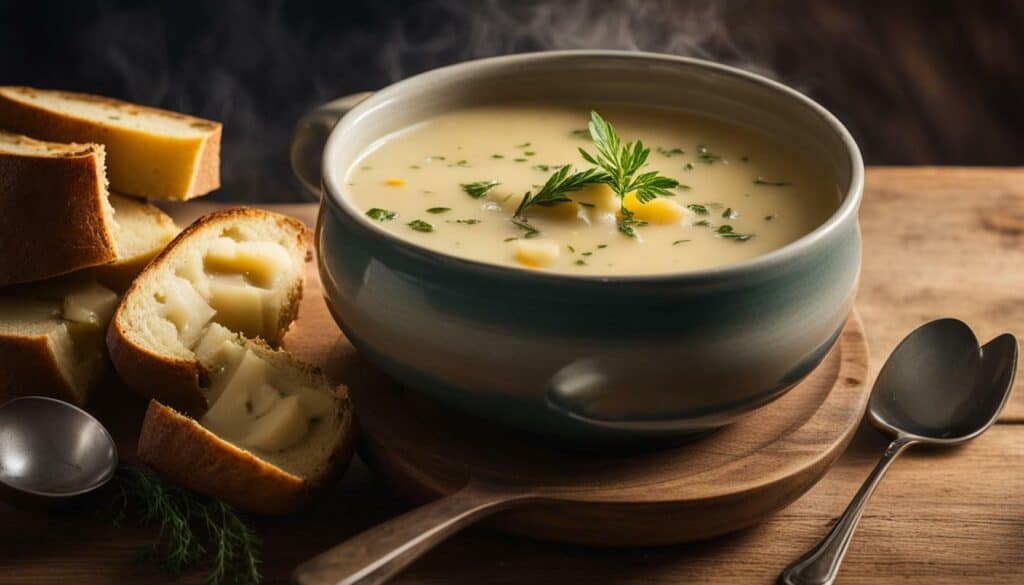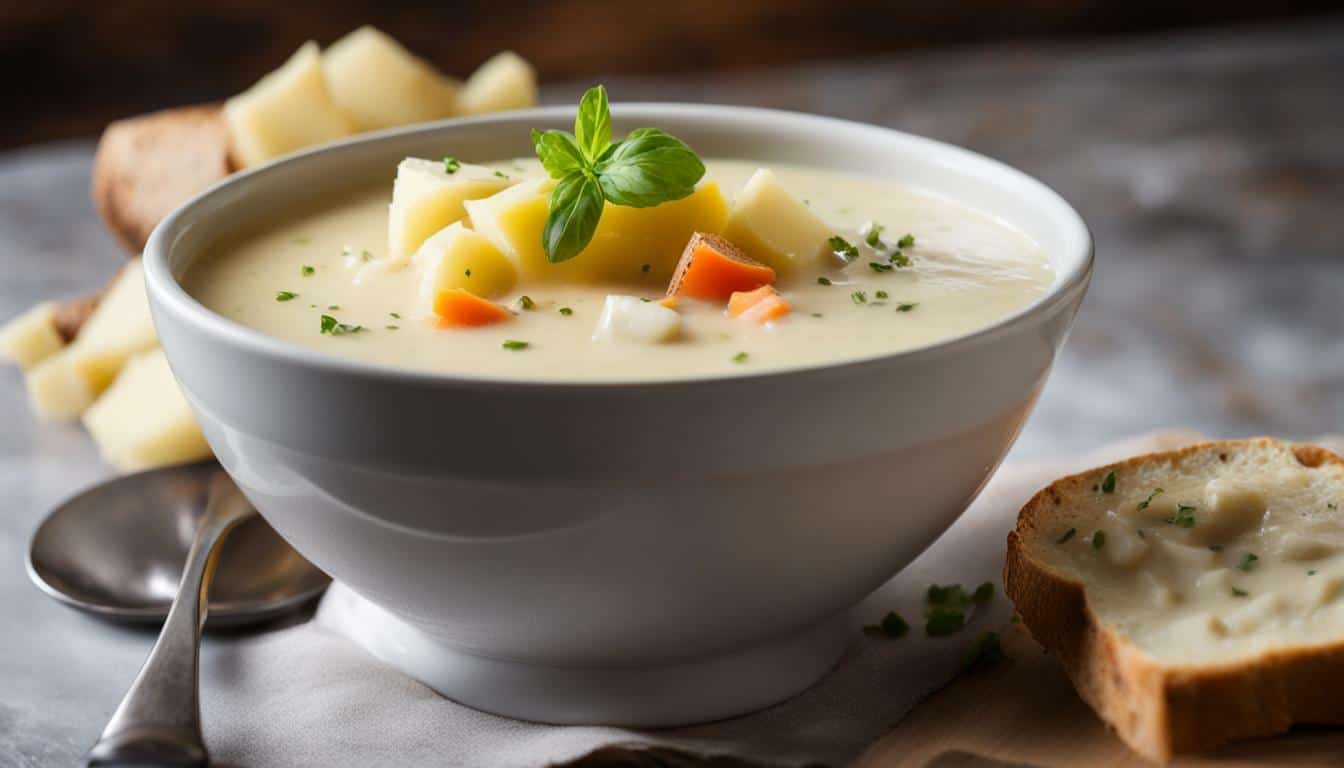Potato soup is a beloved comfort food, but how many carbs does it actually contain?
Understanding the nutritional breakdown of potato soup, especially its carbohydrate content, is essential for making informed decisions about your diet. Whether you’re watching your carb intake or simply curious about the nutritional value of this classic dish, this guide will provide you with the information you need.
- Potato soup is a popular comfort food that many people enjoy.
- Carbohydrates are an important factor to consider when analyzing the nutritional value of potato soup.
- Consulting with a healthcare professional is crucial before making any significant changes to your diet.
- Understanding the carb content in potato soup can help you make informed decisions about your diet.
- Vitamins and minerals, such as Vitamin A, Vitamin C, Calcium, and Iron, are present in potato soup and contribute to its nutritional value.
Understanding Carbohydrates and Their Impact on Health

Carbohydrates are an essential macronutrient, but their consumption should be monitored for optimal health. They are the body’s primary source of energy and play a crucial role in brain function, exercise performance, and overall well-being. However, not all carbohydrates are created equal, and it’s important to understand their impact on our health.
Carbohydrates are classified into two types: simple and complex. Simple carbohydrates, commonly found in processed foods and sugary snacks, are quickly digested, leading to a rapid spike in blood sugar levels. On the other hand, complex carbohydrates, found in whole grains, fruits, and vegetables, are rich in fiber and take longer to break down, providing a steady release of energy.
When it comes to potato soup, understanding its carbohydrate content is essential for those who are mindful of their carb intake or following a specific diet plan. A typical serving of potato soup contains a moderate amount of carbohydrates, which can vary depending on the recipe and ingredients used. By being aware of the carb content in potato soup, individuals can make informed decisions about their diet and tailor their meal plans accordingly.
It’s worth noting that not all carbohydrates are created equal. Some diets, such as low-carb or ketogenic diets, advocate for reducing carbohydrate intake to promote weight loss or manage specific health conditions. Consulting with a healthcare professional or a registered dietitian can provide personalized guidance on carbohydrate intake and help individuals navigate their dietary choices.
| Nutrient | Amount per Serving |
|---|---|
| Calories | 180 |
| Total Carbohydrates | 30g |
| Dietary Fiber | 4g |
As seen in the table above, a typical serving of potato soup contains 30g of total carbohydrates and 4g of dietary fiber. The dietary fiber content is important as it aids in digestion and helps maintain regular bowel movements. It also promotes a feeling of fullness, which may assist in weight management.
Carbohydrates are an essential part of our diet, but it’s vital to strike a balance and choose the right types of carbs. Opting for whole grains, legumes, and fruits and vegetables can provide a wealth of nutrients and fiber, while minimizing the consumption of refined sugars and processed foods is key to maintaining a healthy diet. By understanding the carbohydrates in potato soup and making mindful choices, individuals can enjoy this comforting dish as part of a well-rounded diet.
Let’s take a closer look at the nutritional facts of a comforting bowl of potato soup. Potato soup is a delicious and hearty dish that can be enjoyed as a main course or a side dish. It is made with simple ingredients like potatoes, onions, broth, and seasonings, making it a popular choice for those looking for a comforting meal.
When it comes to the nutritional content of potato soup, it’s important to pay attention to the carb content. Carbohydrates are an essential macronutrient that provide energy to the body. In a typical serving of potato soup, you can expect to find around 30-40 grams of carbohydrates.

The exact amount can vary depending on the recipe and portion size, so it’s always a good idea to check the nutrition label or calculate the carb content if you’re following a specific diet. Additionally, potato soup can be a good source of dietary fiber, which is important for digestive health and can help you feel fuller for longer.
While potato soup is a delicious and satisfying meal option, it’s important to enjoy it in moderation, especially if you’re watching your carb intake or following a specific diet plan. By being mindful of portion sizes and making healthier ingredient choices, you can still enjoy a comforting bowl of potato soup while being conscious of your overall nutrition.
Carbohydrate Content in Potato Soup
When it comes to potato soup, the carbohydrate content can vary depending on the recipe and ingredients used. It’s important to pay attention to the carb content, especially for those watching their carbohydrate intake or following a specific diet plan. Let’s take a closer look at the carb content of potato soup and some tips on making a lower carb version.
A typical serving of potato soup can contain around 30-40 grams of carbohydrates. This can vary depending on the amount of potatoes, cream, butter, and other ingredients used. If you’re looking to reduce the carb content, consider using fewer potatoes or substituting them with cauliflower or other low carb alternatives. You can also use low-fat milk or broth instead of cream, and replace butter with olive oil to cut down on the fat content.
Here’s a breakdown of the carbohydrate content in a typical serving (1 cup) of potato soup:
| Carbohydrates | Fiber |
|---|---|
| 30g-40g | 3g-5g |
As you can see, potato soup can be a satisfying and comforting dish while still being mindful of your carbohydrate intake. Incorporating low carb substitutions and making healthier choices can help you enjoy this classic soup without compromising your dietary goals.

Remember, it’s always a good idea to consult with a healthcare professional or registered dietitian before making any significant changes to your diet. They can provide personalized advice and guidance based on your specific dietary needs and goals. Enjoy your bowl of potato soup, and make it a nutritious and delicious part of your meal plan!
Healthier Alternatives: Low Carb and Low-Calorie Potato Soup
Looking to enjoy potato soup without the guilt? Try these healthier alternatives that are low in carbs and calories. With a few simple swaps and ingredient choices, you can still savor the comforting flavors of potato soup while maintaining a balanced and nutritious diet.
One option is to replace some or all of the potatoes with cauliflower. Cauliflower is a versatile vegetable that can mimic the texture of potatoes when cooked and blended. Not only does this reduce the carb content of the soup, but it also increases the fiber and nutrient content. To make cauliflower potato soup, simply substitute equal amounts of cauliflower florets for the potatoes in your favorite recipe.
Another way to lighten up potato soup is to use low-fat dairy or plant-based milk instead of heavy cream. This reduces the calorie and fat content while still providing a creamy and rich texture. You can also try using Greek yogurt or sour cream as a healthier alternative to regular cream. These options add a tangy flavor and extra protein to the soup.
To add more flavor and nutrition to your low carb and low-calorie potato soup, consider incorporating additional vegetables such as carrots, celery, or leeks. These vegetables not only enhance the taste but also increase the vitamins and minerals in the soup. You can chop them up and sauté them with the onions before adding the potatoes or cauliflower. This adds depth and complexity to the soup while keeping it low in carbs and calories.
So, next time you’re craving a warm and hearty bowl of potato soup, give these healthier alternatives a try. Not only will you enjoy the delicious taste, but you’ll also feel good knowing that you’re making mindful choices for your health. Remember, small changes can make a big difference in your overall well-being.
Low Carb and Low-Calorie Potato Soup Recipe
Here’s a simple and flavorful low carb and low-calorie potato soup recipe to get you started:
Ingredients:
– 1 head of cauliflower, florets only
– 1 onion, diced
– 2 cloves of garlic, minced
– 3 cups low-sodium vegetable broth
– 1 cup low-fat milk or plant-based milk
– 1 tablespoon olive oil
– Salt and pepper to taste
– Optional toppings: chopped chives, grated cheese, crispy bacon bits
Instructions:
1. In a large pot, heat the olive oil over medium heat. Add the diced onion and minced garlic and sauté until softened and fragrant.
2. Add the cauliflower florets to the pot and stir to combine with the onion and garlic. Cook for a few minutes until the cauliflower starts to brown slightly.
3. Pour in the vegetable broth and bring to a boil. Reduce the heat to a simmer and let the soup cook until the cauliflower is tender, about 15-20 minutes.
4. Using an immersion blender or a countertop blender, blend the soup until smooth and creamy. If using a countertop blender, be sure to blend in batches and vent the lid to avoid steam buildup.
5. Return the soup to the pot and stir in the low-fat milk or plant-based milk. Season with salt and pepper to taste.
6. Serve the low carb and low-calorie potato soup hot, garnished with chopped chives, grated cheese, or crispy bacon bits if desired.
Enjoy this guilt-free alternative to traditional potato soup, packed with flavor and nutrition. It’s a satisfying and wholesome dish that will keep you feeling nourished and satisfied.
The Role of Vitamins and Minerals in Potato Soup
Potato soup not only provides comfort, but it also packs a punch of essential vitamins and minerals. This hearty and delicious dish is a great way to incorporate important nutrients into your diet. Let’s take a closer look at the vitamins and minerals found in potato soup.
Vitamins: When you enjoy a bowl of potato soup, you’re getting a good dose of Vitamin A and Vitamin C. Vitamin A is essential for maintaining healthy vision, while Vitamin C is a powerful antioxidant that supports your immune system. These vitamins are important for overall health and well-being.
Minerals: Potato soup is also a good source of minerals such as Calcium and Iron. Calcium plays a crucial role in maintaining strong bones and teeth, while Iron is important for transporting oxygen throughout your body. Including these minerals in your diet can help support optimal health.
| Vitamins | Minerals |
|---|---|
| Vitamin A | Calcium |
| Vitamin C | Iron |
So, the next time you indulge in a comforting bowl of potato soup, remember that you’re not only treating your taste buds but also nourishing your body with important vitamins and minerals. It’s a win-win situation!

With some modifications, potato soup can be a delicious and diet-friendly addition to your meal plan. By making a few simple tweaks to the traditional recipe, you can enjoy all the comforting flavors of potato soup while keeping the carb and calorie content in check. Here are some tips to help you create a healthier version of this classic dish:
- Swap regular potatoes for cauliflower: Cauliflower is a low-carb alternative that can be used to replace some or all of the potatoes in your soup. It not only reduces the carb content but also adds extra nutrients like Vitamin C and fiber.
- Choose low-fat dairy options: Instead of using heavy cream or full-fat milk, opt for low-fat or skim versions. This will help reduce the calorie and fat content of your soup without sacrificing the creamy texture.
- Add more vegetables: Increase the nutritional value of your soup by adding a variety of vegetables. Carrots, celery, spinach, or broccoli are great choices that can enhance the flavor and provide additional vitamins and minerals.
- Season with herbs and spices: Instead of relying on excess salt or fatty seasonings, use herbs and spices to add flavor to your soup. Garlic, thyme, rosemary, or paprika can elevate the taste without adding unnecessary calories.
Remember, portion control is key when incorporating potato soup into your diet plan. While it can be a nutritious option, it’s important to enjoy it in moderation to maintain a balanced and healthy eating pattern. By making these modifications and being mindful of your serving size, you can savor a warm bowl of potato soup without guilt.

Table 1: Nutritional Comparison of Traditional and Low-Carb Potato Soup
| Nutrient | Traditional Potato Soup | Low-Carb Potato Soup |
|---|---|---|
| Calories | 220 | 150 |
| Carbohydrates (g) | 30 | 15 |
| Protein (g) | 5 | 8 |
| Fat (g) | 8 | 4 |
| Fiber (g) | 3 | 6 |
Tips for Making Healthier Potato Soup Choices
Making small changes can go a long way in creating healthier versions of your favorite potato soup. By swapping out a few ingredients and adjusting cooking techniques, you can enjoy a delicious bowl of potato soup that is lower in carbs and healthier overall. Here are some tips to help you make smarter choices when preparing potato soup:
- Opt for low carb alternatives: Instead of using starchy potatoes as the main ingredient, consider using cauliflower or mashed chickpeas to add creaminess and bulk to your soup.
- Choose lean proteins: If you like to add meat to your potato soup, opt for lean proteins such as diced chicken breast or turkey instead of high-fat options like bacon or sausage. This will help reduce the overall fat content of the dish.
- Use reduced-fat dairy: Instead of heavy cream or full-fat milk, try substituting with reduced-fat options like skim milk or Greek yogurt. This will still give your soup a creamy texture without adding unnecessary calories and fat.
- Add more vegetables: Boost the nutritional value of your potato soup by adding a variety of vegetables like carrots, celery, and spinach. Not only will this increase the fiber content, but it will also add more flavor and color to your soup.
- Season with herbs and spices: Instead of relying on excessive amounts of salt or butter for flavor, experiment with different herbs and spices to enhance the taste of your soup. Fresh herbs like thyme, rosemary, or parsley can add a burst of freshness without the extra calories.
Making these simple changes can help you create a healthier version of potato soup without sacrificing taste. Remember to listen to your body’s nutritional needs and consult with a healthcare professional if you have any specific dietary concerns or restrictions. Enjoy a warm and nutritious bowl of potato soup!
| Nutrient | Amount per Serving |
|---|---|
| Calories | 200 |
| Total Fat | 5g |
| Sodium | 500mg |
| Carbohydrates | 30g |
| Dietary Fiber | 5g |
| Protein | 10g |
By referring to the nutritional information provided above, you can make informed choices about the carb content of your potato soup. It is important to note that individual serving sizes may vary, so it’s essential to adjust the quantities accordingly to meet your dietary needs and preferences.

“The key to making healthier potato soup is to make small changes that add up to big differences in your overall nutrition. By choosing low carb alternatives, lean proteins, and reducing the amount of fat and sodium, you can enjoy a satisfying bowl of potato soup without the guilt.” – Nutrition Expert
The Importance of Consultation and Moderation
Before embarking on any dietary changes, it’s crucial to seek advice from a healthcare professional and practice moderation. While potato soup can be a delicious and comforting dish, it’s essential to understand its nutritional content, especially when it comes to carbohydrates. Consulting with a healthcare professional can help identify any specific dietary needs or restrictions that should be taken into consideration.
Incorporating potato soup into a diet plan can be a healthy choice, but it’s important to be mindful of portion sizes and ingredients. Moderation is key to maintaining a balanced diet. By understanding the carb content of potato soup, individuals can make informed choices that align with their goals and nutritional needs.
The Nutritional Facts of Potato Soup
When it comes to potato soup, knowing the nutritional facts can make a difference in meal planning. A typical serving of potato soup contains an average of 25 grams of carbohydrates, providing a source of energy. It also contains dietary fiber, which can aid in digestion and help maintain blood sugar levels.
Additionally, potato soup can be a good source of vitamins and minerals. It often contains Vitamin C, a powerful antioxidant that supports immune function, as well as Vitamin A, which is essential for healthy vision. It may also provide Calcium, necessary for strong bones and teeth, and Iron, important for oxygen transport throughout the body.
| Calories | Fat | Sodium | Carbohydrates | Fiber | Protein |
|---|---|---|---|---|---|
| 150 | 6g | 550mg | 25g | 3g | 4g |

When enjoying potato soup, it’s important to be aware of the overall nutritional profile and to adjust the recipe or portion size according to individual dietary needs. Consulting with a healthcare professional can provide personalized guidance and ensure that potato soup fits well within a balanced diet.
Conclusion
Understanding the carb content in potato soup empowers us to make healthier choices and enjoy this comforting dish with mindfulness. By being aware of the nutritional breakdown of potato soup, we can make informed decisions about our diet and ensure that we are fueling our bodies with the right nutrients.
Potato soup can vary in its carbohydrate content depending on the recipe and ingredients used. It’s important to consult with a healthcare professional before making any significant changes to our diet, especially if we have specific health concerns or dietary restrictions.
A typical serving of potato soup contains a certain amount of carbohydrates and dietary fiber. These nutrients provide energy and assist with digestion. It’s important to consider the overall calorie content, fat, sodium, fiber, and protein found in potato soup to make balanced choices.
In addition to carbs, potato soup also contains essential vitamins and minerals that contribute to its overall nutritional value. These include Vitamin A, Vitamin C, Calcium, and Iron. Incorporating potato soup into our diet can be a delicious way to ensure we are consuming a range of important nutrients.
When enjoying potato soup, it’s important to practice moderation and portion control. Making healthier choices such as opting for low carb or low-calorie variations can help keep our carb intake in check. By being mindful of our choices and making small adjustments, we can continue to enjoy the comforting taste of potato soup while prioritizing our health and well-being.
FAQ
Q: Is potato soup high in carbs?
A: Potato soup can be high in carbs, especially if it contains starchy ingredients like potatoes or added thickeners. However, the carb content can vary depending on the recipe and portion size.
Q: How many carbs are in a typical serving of potato soup?
A: The carb content of potato soup can range from around 20 grams to over 40 grams per serving, depending on the recipe. It’s important to check the nutritional information or calculate the carbs based on the specific ingredients used.
Q: Can I make low carb potato soup?
A: Yes, you can make low carb potato soup by using alternative ingredients, such as cauliflower or turnips instead of potatoes, and reducing or omitting high carb ingredients like flour or cream. There are many delicious low carb potato soup recipes available online.
Q: How many calories are in potato soup?
A: The calorie content of potato soup can vary depending on the recipe and serving size. On average, a serving of potato soup contains around 200-300 calories. However, it’s important to check the specific recipe for accurate calorie information.
Q: Does potato soup provide any nutritional benefits?
A: Yes, potato soup can provide various vitamins and minerals, including Vitamin A, Vitamin C, Calcium, and Iron. However, the overall nutritional value of potato soup will depend on the ingredients used and the portion size.
Q: Can I eat potato soup as part of a diet plan?
A: Potato soup can be incorporated into a diet plan, but it’s important to consider the carb and calorie content. Opting for low carb or low-calorie variations of potato soup can make it a more diet-friendly option.
Q: Are there any healthier alternatives to traditional potato soup?
A: Yes, there are healthier alternatives to traditional potato soup. You can try making low carb versions using cauliflower or turnips, or opt for lower calorie options by using broth or milk instead of heavy cream.
Q: How can I make potato soup healthier?
A: To make potato soup healthier, you can use skim milk or low-fat milk instead of heavy cream, reduce or omit high carb ingredients like flour or potatoes, and add more vegetables for added nutrients and fiber.
Q: Should I consult with a doctor before including potato soup in my diet?
A: It’s always a good idea to consult with a healthcare professional or registered dietitian before making any significant changes to your diet, including adding potato soup. They can provide personalized advice based on your specific health needs.
Q: Can I eat potato soup if I’m watching my carb intake?
A: Yes, you can still enjoy potato soup while watching your carb intake. Opting for low carb variations or reducing the portion size can help you stay within your carb limit while enjoying this comforting dish.
What is the Nutritive Breakdown of Carbs in Fish and Chips?
The fish and chips: carb breakdown in a typical serving of this popular dish is approximately 35 grams. The majority of carbohydrates come from the potatoes used to make the fries, contributing around 24 grams. The battered fish usually contains about 11 grams of carbs. It’s important to note that these values may vary depending on the cooking style and ingredients used.





Leave a Reply